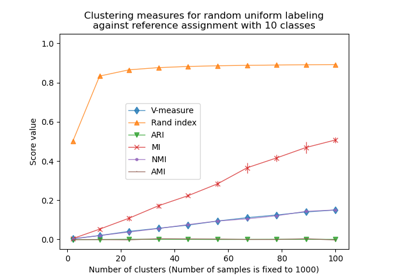rand_score#
- sklearn.metrics.rand_score(labels_true, labels_pred)[source]#
Rand index.
The Rand Index computes a similarity measure between two clusterings by considering all pairs of samples and counting pairs that are assigned in the same or different clusters in the predicted and true clusterings [1] [2].
The raw RI score [3] is:
RI = (number of agreeing pairs) / (number of pairs)
Read more in the User Guide.
- Parameters:
- labels_truearray-like of shape (n_samples,), dtype=integral
Ground truth class labels to be used as a reference.
- labels_predarray-like of shape (n_samples,), dtype=integral
Cluster labels to evaluate.
- Returns:
- RIfloat
Similarity score between 0.0 and 1.0, inclusive, 1.0 stands for perfect match.
See also
adjusted_rand_scoreAdjusted Rand Score.
adjusted_mutual_info_scoreAdjusted Mutual Information.
References
Examples
Perfectly matching labelings have a score of 1 even
>>> from sklearn.metrics.cluster import rand_score >>> rand_score([0, 0, 1, 1], [1, 1, 0, 0]) 1.0
Labelings that assign all classes members to the same clusters are complete but may not always be pure, hence penalized:
>>> rand_score([0, 0, 1, 2], [0, 0, 1, 1]) 0.83
Gallery examples#

Adjustment for chance in clustering performance evaluation
Adjustment for chance in clustering performance evaluation